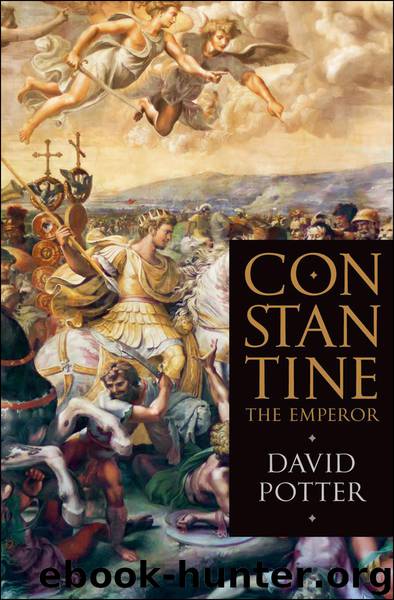Constantine the Emperor by Potter David;

Author:Potter, David;
Language: eng
Format: epub
Publisher: Oxford University Press, Incorporated
In very truth it was not without good cause that the mercy of Christ withdrew from these, in whom it is clear as day that their madness is of such a kind that we find them abhorrent even to the heavenly dispensation; so great a madness persists in them when, with incredible arrogance, they persuade themselves of things that it is not right either to say or hear, repudiating the equitable judgment that had been given by the will of heaven.… They demand my judgment, when I myself await the judgment of heaven.22
Does the emperor’s vehemence of expression in this letter hint at the possibility that one of the weaknesses he admits to recognizing in himself was a ferociously bad temper? Perhaps he was impatient with those who didn’t see the world his way—a trait that certainly appears in his correspondence with Maximus, despite his obvious respect for the man. Marcus Aurelius once had written to himself that it was crucially important for an emperor to control his emotions. Constantine seems to have striven toward the same goal, and his dealings with Donatus would prove a mighty test.23
Constantine had a good deal to say on his own account about the outcome of the council, writing letters (of which two have been preserved) condemning the Donatists.24 And there the matter would have remained if the Donatists had not returned with fresh complaints at the beginning of 315, producing documents, as the bishops assembled at Arles said they must, to prove that Felix of Abthungi, the man who had ordained Caecilian, was a traditor. When the governor of Africa heard the case, he found that the evidence against Felix was forged.25 This did not stop the Donatists. They lodged yet another complaint with Constantine, who equivocated, first allowing the Donatist bishops who had been held in Gaul to return to Africa, then changing his mind and summoning them to a fresh hearing at which Caecilian would be present.
The business dragged on into the fall of 315, when Constantine, now at Milan, and with much else to concern him (not least, the birth of a son to his brother-in-law Licinius), again pronounced in favor of Caecilian. The Donatists accepted his decision with the same grace that they had shown in response to all previous decisions, continuing to spark riots at Carthage as they had throughout the year. Constantine finally lost patience. On November 10, 316, having left Cibalae in Croatia at that point in pursuit of Licinius’ army, he wrote to the vicarius of Africa outlining the history of the dispute and, possibly, ordering Donatist churches to be confiscated.26 In 319, he would write to the Etruscan senator Verinus, telling him that when slanderous pamphlets turn up, the person slandered should suffer no harm, but, rather, the slanderer should be apprehended and made to prove his case in court. The ruling would have applied to the Donatists, for Constantine now banished the controversy from the realm of religion and placed it in the remit of civil and criminal law.
Download
This site does not store any files on its server. We only index and link to content provided by other sites. Please contact the content providers to delete copyright contents if any and email us, we'll remove relevant links or contents immediately.
| France | Germany |
| Great Britain | Greece |
| Italy | Rome |
| Russia | Spain & Portugal |
Fanny Burney by Claire Harman(26603)
Empire of the Sikhs by Patwant Singh(23086)
Out of India by Michael Foss(16853)
Leonardo da Vinci by Walter Isaacson(13336)
Small Great Things by Jodi Picoult(7141)
The Six Wives Of Henry VIII (WOMEN IN HISTORY) by Fraser Antonia(5515)
The Wind in My Hair by Masih Alinejad(5095)
A Higher Loyalty: Truth, Lies, and Leadership by James Comey(4964)
The Crown by Robert Lacey(4817)
The Lonely City by Olivia Laing(4802)
Millionaire: The Philanderer, Gambler, and Duelist Who Invented Modern Finance by Janet Gleeson(4478)
The Iron Duke by The Iron Duke(4356)
Papillon (English) by Henri Charrière(4274)
Sticky Fingers by Joe Hagan(4198)
Joan of Arc by Mary Gordon(4110)
Alive: The Story of the Andes Survivors by Piers Paul Read(4032)
Stalin by Stephen Kotkin(3965)
Aleister Crowley: The Biography by Tobias Churton(3640)
Ants Among Elephants by Sujatha Gidla(3467)
